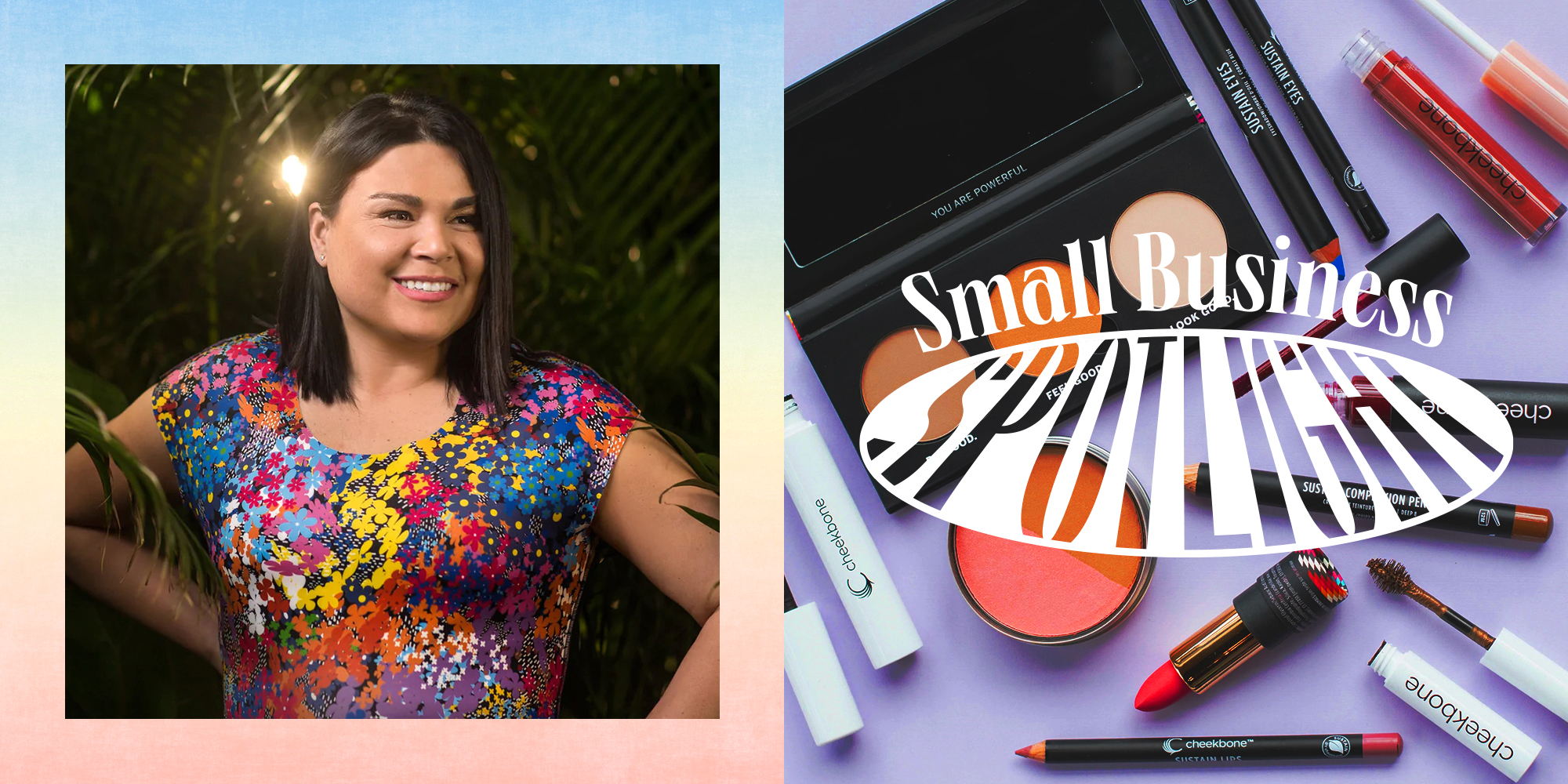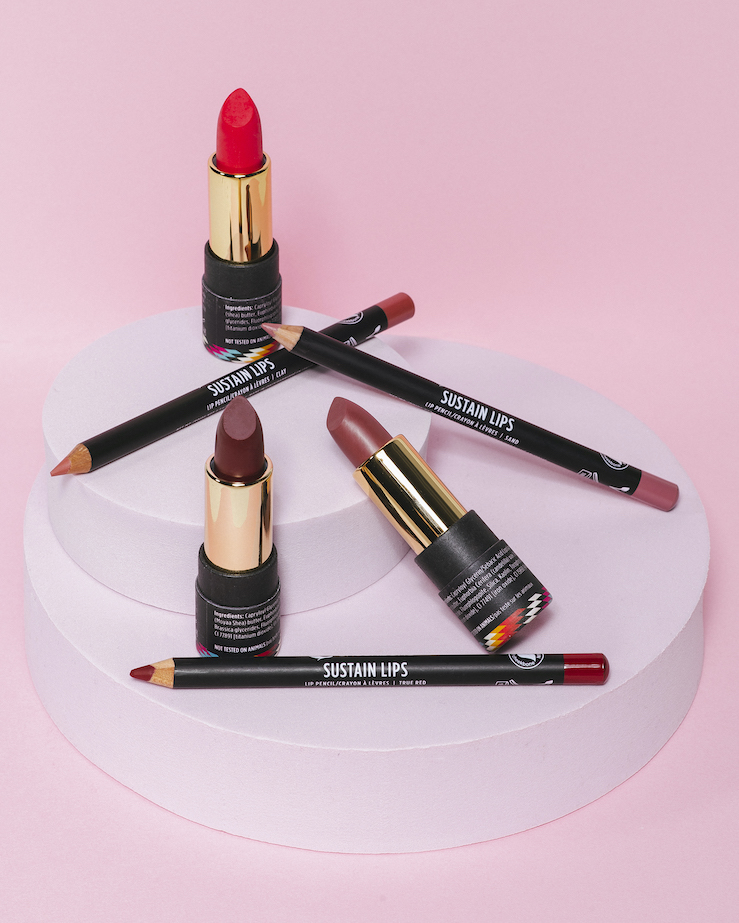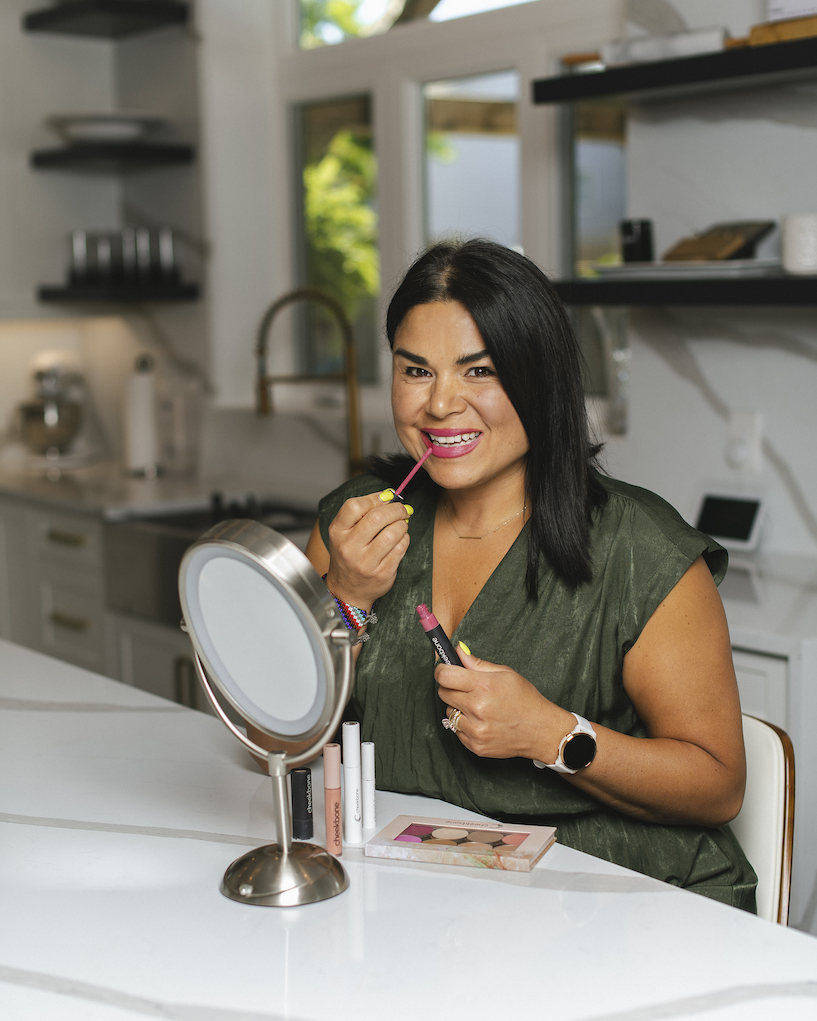Small Business Spotlight: Cheekbone Beauty
Founder Jenn Harper infuses the beauty industry with Indigenous principles.

Women running their own companies? We love to see it. In our series Small Business Spotlight, we chat with independent fashion entrepreneurs about their journey to be-your-own-boss status. Here, tips for raising funds, developing a marketing strategy, navigating social media, and more—straight from women who have done it themselves.
Cheekbone Beauty came to founder Jenn Harper in a dream. “I had a literal pop out of the bed in the middle of the night dream, where Indigenous girls like me were covered in lip gloss,” she tells Marie Claire. “They had the rosiest little cheeks and I remember them filled with joy, and laughter.” After waking up from that powerful and vibrant vision, Harper immediately grabbed her laptop to figure out how to make a lip gloss company, while also making sure she was doing good with the profits it made. She ultimately wanted to make something in honor of her grandmother. And thus, Cheekbone Beauty was born.
The name came to Harper nine months into 2015, as she was listening to a business podcast with Spanx founder, Sara Blakely. In it, Blakely shared the memorability of the “k” sound, which inspired Harper. That tidbit, combined with research that people with high cheekbones are considered more trustworthy (and is a beloved facial feature within Harper’s own Ojibwe community), was all she needed to forge ahead.
Cheekbone Beauty is a brand that centers an Indigenous worldview—from the formulations that incorporate millenia-old ingredients that are intrinsic to Native cultures to their customer service approach which hinges on community. “Our worldview of supporting the community is a vital part of Indigenous culture,” says Harper. “We don’t define success as attaining things for self, but instead about what you can do for those around you.”
One of Harper’s proudest moments to date is getting Cheekbone Beauty’s B-Corp certification, which denotes high standards of accountability and transparency when measuring a company’s environmental and social impact. “It represents an obligation to people and the planet and we really love the platform and the community of the B-Corp world because it aligns with our Indigenous values,” Harper says.
The future for Cheekbone Beauty is already so bright and includes repurposing and reusing waste from the fruit and wine region in the Niagara region where the brand is located. Harper and her team received major funding from the Canadian government to do a research and innovation project that extracts actives from waste. And though they’re only an indie color cosmetics brand (for now), they built a lab and employ a full-time scientist on their team. This innovation is another source of pride for the brand, as it represents the future of beauty and the larger cultural Indigenous principles around sustainability. Here, Harper explains how her Indigenous-owned beauty brand became the center of sustainable cosmetics.
On the Power of Representation
“Sustainability means sustaining our communities because our people need to be empowered. One thing my brother said to me before he died when I was telling him about the business was that our kids just need hope and help. It wasn’t until June 2021 when his words and the power of representation came to fruition.
Get exclusive access to fashion and beauty trends, hot-off-the-press celebrity news, and more.
We visited all the Sephoras in Canada that stocked our products, along with speaking to their staff and teams. The last event was at the Sephora in the Eaton Center, which is a mall I would go to with my dad when I was growing up. In the past, we would be accused of stealing merchandise when we went there, along with being accosted because of our status cards which give us some tax exemptions. But in 2021, there’s a massive billboard with our brand there, which the younger me who grew up in Native public housing could have never imagined.
During the event, this Anishinaabe girl comes in and her glow and joy are everything. Seeing someone who looks like her and who comes from the same community helps her to envision what’s possible for her life. Now her dreams for herself and her community are endless after seeing someone like her do something on a grand scale.”

On funding and hiring
“I had this internal battle going on because I don’t have money and I don’t come from generational wealth. In business, they call it the friends and family round, but my friends and family don’t have money. And if they did, would they give it to me, who has never been in the beauty industry?
Thankfully, we found investors and the more I got to know them, I realized they really weren’t investing in the business at first—they were investing in me. Based on their experience, they’ve told me it takes a certain kind of person to push things forward. Now that I know they’re investing in my work ethic, it really boils down to passion—the kind that connects people to that idea when you’re having conversations with them. I don’t have a fancy business degree and I dropped out of college, so it’s really about work and the drive for me. Then, a good entrepreneur hires people who can help, once they get the right amount of funding. In the early days, we had no money to hire anyone who knew about the subjects we needed support with. But ultimately, I’ve been able to hire people who are smarter than me in different areas and who can help me build this dream and vision as I carry it forward as a leader. The people who come along with you have the skills to help you get there.
We were so fortunate to be on Canada’s version of Shark Tank called Dragon’s Den. We met our investors right before we went on the show. They were new to the funding world and were known as social impact investors, as well as being Indigenous-led which was huge. I’m not sure we would’ve got investment without their funding to be honest. But I’m super grateful because they’ve been our partners since 2019 and they’ve helped us grow the sustainable part of our brand with enough capital.”
The Cheekbone Safe Haven
"We’ve made the choice as a brand to not speak to every social issue, even though we care about social movements—that’s what our brand is all about at the end of the day. But the amount of hate we receive just from commenting on the news or saying what we believe is right led us to decide to take a step back. We want to be a soft place for every human being to land. I’m always thinking of Indigenous youth and a young person isn’t quite equipped yet in life with the ability to handle all these different things. So it’s important to make our platform a really safe place to be for them specifically. Then, we have a ton of allies, so we want people to come to us with questions they may think are strange.
We do a lot of content around our Indigenous culture and language. And we make mistakes—one of the Grandfather Teachings is humility—so we will always humbly apologize for saying another tribe’s words incorrectly, for instance. People have corrected us and we go back and fix it. The whole point of us sharing language is that it was robbed from many grandmothers, including mine. To use one of our words as a lipstick name means we’re adding an Indigenous word on the lips of anyone who chooses to wear it. Our allies will sometimes come to us with questions about pow-wows and what’s acceptable—we want to be the place where they do that. If we don’t have the answer, we will certainly find them resources and platforms where they’re better equipped to answer those questions.”

Jenn Harper, Founder of Cheekbone Beauty.
On Healing from Trauma
“Just two months prior to launching Cheekbone, I became sober after battling alcoholism for many years. While getting sober, I learned about my grandparents’ experiences at residential boarding schools—the school system that was created by the government and church during colonization in the United States and Canada to assimilate Indigenous and First Peoples children into a more European way of life. There were so many negative impacts about those school systems and reporting from The New York Times showed the discovery of bodies of Native children in unmarked graves across many states and provinces in North America. It’s truly tragic, but it helped me to better understand my grandmother’s story. The system it created was really harmful because it robbed Indigenous people of their culture and their language.
All of this gave me words and language around my own trauma, which is generational and is the case for many First Peoples families. I had one of the symptoms of it, which was addiction. Another symptom of this is suicide and I lost my brother, BJ, to suicide. This happens amongst First Peoples children more than any other culture. These problems still exist in so many of the reservation systems that we see today.”
On Measuring Your Passion Meter
“We have such great relationships now with our Australian and New Zealand brothers, sisters, and communities there. There was an event I was asked to virtually speak at for no cost in Australia and I had to be up at 3 a.m. to do it. When I thought about it later, I realized that’s what passion is because all I did was share a bit of wisdom on how I grew my business. But I was speaking to people who come from the same history of colonization and are living through the negative impacts of that. So I didn’t think twice about doing it.
Measure your passion meter and if you’re going to wake up at 3 a.m. in the morning and do something for free for the business you want to build, then you’re good. Keep going. Then commit to it every single day with consistency. I have consistently woken up for the last six years to do something to move the Cheekbone business forward. If you have that passion and do that, it’s sure to succeed.”